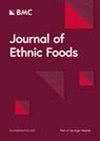rkiye当地土耳其咖啡品种的空间分布
Q1 Social Sciences
引用次数: 0
摘要
本研究旨在确定土耳其当地的咖啡种类在本文章由计算机程序翻译,如有差异,请以英文原文为准。
Spatial distribution of Türkiye’s local Turkish coffee kinds
Abstract This research aims to determine the contents, cooking, and serving styles of local Turkish coffee kinds in Türkiye and to reveal their differences from traditional Turkish coffee. In addition, the distribution of local Turkish coffee kinds determined according to cities and regions was determined. Document analysis was applied to determine the features of local Turkish coffee kinds. In the document analysis, local Turkish coffee kinds are divided into three basic categories according to the codes of “coffee content,” “serving style,” “cooking method,” and “difference from traditional Turkish coffee.” Turkish coffee in the first category is prepared without using coffee powder, and local Turkish coffee kinds in the second category differ from traditional Turkish coffee with their features such as the coffee beans are roasted and ground, the presentation of the coffee, the degree of cooking, and the cooking method of the coffee. Different products (local products) are mixed into the coffees in the last local Turkish coffee category. Additionally, local Turkish coffees specific to cities were collected under the “city/region authenticity” code. Black Cumin Coffee, Mırra Coffee, Menengic Coffee, Kenger Coffee, Turkish coffee cooked in a cup, and Dibek Coffee are common local Turkish coffee kinds in some cities and regions.
求助全文
通过发布文献求助,成功后即可免费获取论文全文。
去求助
来源期刊

Journal of Ethnic Foods
Social Sciences-Anthropology
CiteScore
4.00
自引率
0.00%
发文量
43
审稿时长
16 weeks
期刊介绍:
The Journal of Ethnic Foods provides comprehensive coverage about people’s consumption of food and aims to illuminate the benefits of traditional understanding and knowledge of foods developed over a long time. Food and eating are studied by several disciplines because food has always been more than just nutrients. Food studies have provided better insights into important societal processes involving economics, health, politics, history, and the environment. The journal emphasises research that explores food, gastronomy and eating behaviours that are related to particular geographical contexts and ethnicities. The uniqueness, variety and creativity of food traditions and cultures, as well as the complex interplay of societal and environmental factors can be fully understood by considering perspectives on ethnography, cultural anthropology, population health and well-being, biology, history, ecology and geography. Articles in scope with the journal should cover these areas. The journal welcomes review articles in all those fields, especially those highlighting the multidisciplinary nature of the study of ethnic food.
 求助内容:
求助内容: 应助结果提醒方式:
应助结果提醒方式:


